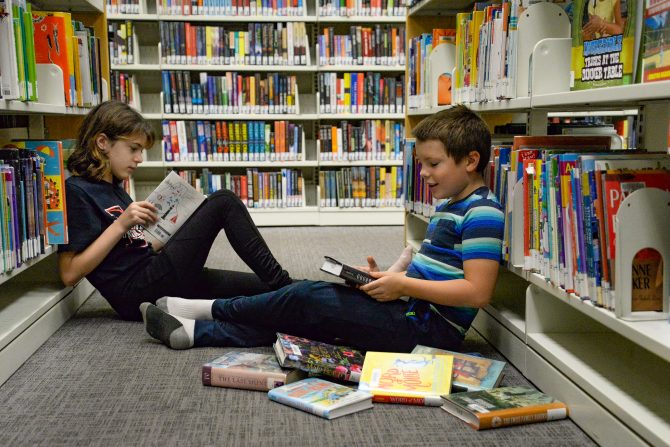Have you heard of the summer slide? Not the fun summer slide where you spend all summer at the waterpark, but the one that causes kids to lose up to one month of learning over the course of the summer.
Studies show that reading for as few as six hours over the summer can make a huge difference in combatting summer learning loss, especially in terms of reading comprehension and writing skills, areas that can enhance performance in all other subjects. The great news is that reading prevents the summer slide best when students read for enjoyment and choose materials themselves.
Engaging Kids in Summer Reading
So how do you get kids to read in the summer? Here are a few tips for parents and caregivers:
- Take your kids to the library, often! Quite simply, access to more books means more reading.
- Let your kids choose their own reading material. The act of reading and finding pleasure in that reading makes the biggest difference, so encourage your child to read anything and everything that interests them. This is the single most important factor in getting children to read more.
- Don’t discount (or judge) non-traditional formats. Graphic novels, audiobooks, music, videos, and games can get reluctant readers into the library and serve as gateways to reading print material. Embrace these options if that’s what interests your child.
- Enjoy reading as a family. Read out loud to each other, choose books together, or have an older sibling read to a younger child.
- Model reading behaviours. Children who see adults reading, and enjoying reading, are much more likely to want to read themselves.
- Read daily. There are many opportunities throughout the day to read, even if it’s just for a short time. Make it easy by placing new books from the library around the house where kids will find them and capitalize on your child’s individual interests. For example, if your child likes food, show how you can use a recipe to make delicious treats! At night, always read as a key part of your bedtime routine.
- Make reading more social and interactive. Reading is most effective when children understand what they’re reading. Parents and caregivers can help grow their understanding with a few simple activities: ask questions about the story and allow the child to ask questions; summarize the story or ask the child to summarize and re-read hard-to-understand passages. Look up new words together and relate concepts in the story to your child’s life. Adult involvement is especially beneficial to younger children just learning how to read.
- Sign your kids up for Summer Starts at EPL. EPL tries to make reading fun with our annual summer reading challenge, which is part of our Summer Starts program. Kids track their reading activity, and for every six hours of reading completed, they receive a prize ballot and get to make their own button.
Join Summer Starts at EPL
Summer Starts at EPL also includes free classes and events, with something exciting happening every day at all 21 EPL locations. Find out about activities at a branch near you and learn more about Summer Starts.
Not sure what your children should be reading? The TD Summer Reading Club, together with The FOLD and GoodMinds.com, have compiled a list of Recommended Reads. Here are some of their recommendations:
Summer Reading for Preschool Kids | Edmonton Public Library | BiblioCommons
Summer Reading for Kids in K-3 | Edmonton Public Library | BiblioCommons
Summer Reading for Kids in Grades 4-6 | Edmonton Public Library | BiblioCommons



Add a comment to: Understanding Summer Slide and Its Impact on Learning